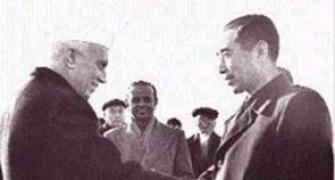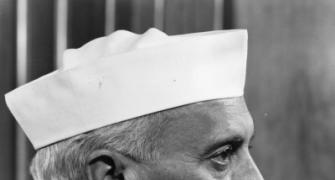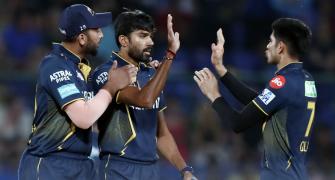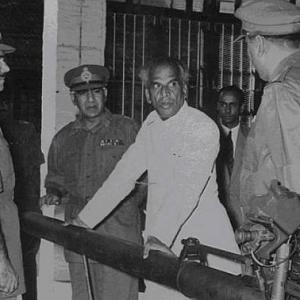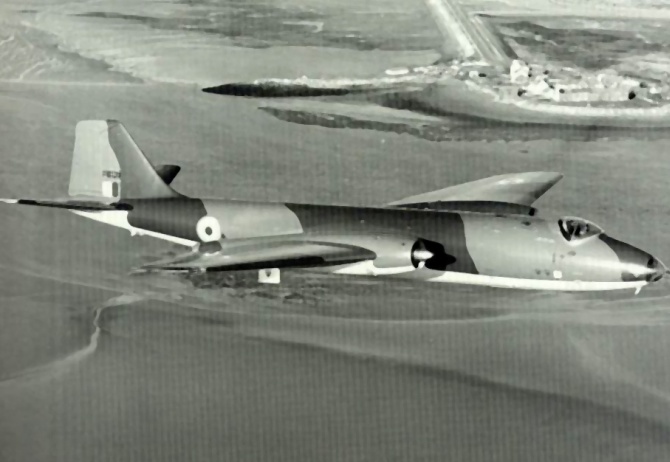'The Congress party hated him because he had not gone to jail, he was not lathi charged, he had not gone on hunger strike.'
'They felt he had lived in London all his life and then he came to India and became an MP and a minister.'
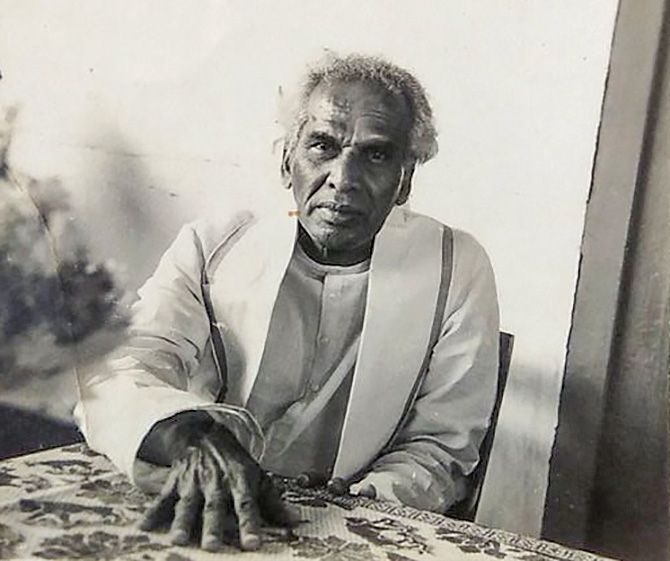
A Chequered Brilliance, The Many Lives of V K Krishna Menon, Jairam Ramesh's latest book, profiles a brilliant man who modern India remembers only for his one failure.
V K Krishna Menon is perhaps one of the most misunderstood politicians in modern Indian history.
"He certainly did much to make himself misunderstood; his style, the manner of his speaking, the sarcasm... He was too brilliant for his own good. He didn't suffer fools kindly. He was idiosyncratic to the extreme," Ramesh tells Rediff.com's Shobha Warrier in the first of a two-part interview:
You start your book with the statement, 'This is a book on one of India's most compelling, consequential and controversial political personalities'. According to you, what made him compelling, consequential and controversial?
From 1930 till 1947, he was a one-man army for Indian Independence in England. He was the link between Jawaharlal Nehru and the (British) Labour Party. He was the indefatigable campaigner all over England for India's Independence. He, in my view did the most to make the idea of Indians independence acceptable to the Labour Party.
Of course, he was helped by his guru at the London School of Economics, Harold Laski. That was one reason he was consequential.
The second reason why he is consequential is because from 1947 till 1957, he was India's global envoy and the face of India in international forums.
He was Nehru's envoy and played a very important role in the United Nations on issues like Korea, Algeria, Cyprus, Suez. In 1955, he almost brought about rapprochement between Communist China and the USA.
The third reason why he was consequential is he was Nehru's soulmate. Ideologically, he was on the same wavelength as Nehru; they were both democratic socialists in every sense of the term.
Krishna Menon was the only man Nehru felt comfortable with in the Congress party. Both were English-educated, both left of centre, both good British and good Indians.
The only other person Nehru would have felt comfortable intellectually was Rajaji, but by the early 1950s, Rajaji had begun to drift apart. Then, Rajaji was in Madras and Nehru was in Delhi.
He is controversial because of his role in the 1962 India-China war debacle. When somebody asked him, 'Why does controversy always come to you?' He replied, 'Controversy moves towards me, I move in the same direction, and we meet half way through.'
He attracted controversy by what he said and by what he did; he attracted controversy by even his silences.
He is compelling because of his personality. He was a remarkably well-read person. He founded Pelican Books. He was a borough councillor in London and a municipal councillor in London for almost 14 years.
He was an intellectual who had the best of friends in British intellectual society. He was very close to the Mountbattens, probably closer to them than Nehru, and played a very important role in the negotiations leading to Partition.
He was contradictory also; he was a prisoner of his own insecurities and was always unsure of himself vis a vis Nehru, vis a vis the Congress party. Then, he handled himself with great amount of dignity.
Did your impressions of Krishna Menon change after you finished your research on him?
I was interested in Krishna Menon because I was a student of Nehru and Nehru's politics. I knew Krishna Menon had played a crucial role in Nehru's life from 1935. He was responsible for getting Nehru's autobiography published, then his second and also the third book, Discovery of India.
Krishna Menon's pre-1947 period was a surprise to me. I knew a lot of Krishna Menon post-1947. I didn't know about the kind of contributions he had made in pre-1947 times, the kind of lobbying he had made.
Was it a revelation for you?
Pre-1947 was a complete revelation to me. With the kind of lobbying he had made with the Labour Party, in my view, he made the idea of Indian Independence acceptable to the British.
So, I would say one great contribution of this book to my own education, has been the fuller realisation of Krishna Menon's pre-1947.
Malayalis will be horrified to know that Krishna Menon was against the creation of Kerala in 1956. He wrote to Nehru in 1955, 'Don't listen to this Malayali' -- he was referring to K N Panikkar -- 'and create an independent Kerala because an independent Kerala will become a red bastion for Communism.'
He also wrote, 'Don't split up the erstwhile state of Madras because Madras will become a bastion of fanaticism and separatism.'
He advocated the creation of a Dakshin Pradesh.
Was he a Communist at heart? He was a member of the Labour Party and in 1969 the Communists were responsible for his election from West Bengal.
E M S Namboodiripad (the Communist Party of India-Marxist leader) and C Achutha Menon (the Communist Party of India leader) helped him get elected from Trivandrum in 1971.
No, he was not a Communist. He said once and I have quoted him in my book, 'the fact that Communists vote for me does not mean I like the Communists. But the Communists like me.'
He became close to the British Communist party because they were the first to argue for full Independence to India. The Labour Party was divided, but the (British) Communist party consistently spoke for India's Independence. That was why he was close to them.
Did he admire Communist ideology?
He was naturally a leftist; very strong left of centre. He was a great admirer of Karl Marx as was Nehru, and the Marxian mode of enquiry and questioning. But he was not a Marxist.
He was a great admirer of the Soviet Union. He negotiated a settlement with China.
But I do not agree with the argument that he was a Communist. He was an unrepentant Socialist, a democratic Socialist and not an authoritarian Socialist.
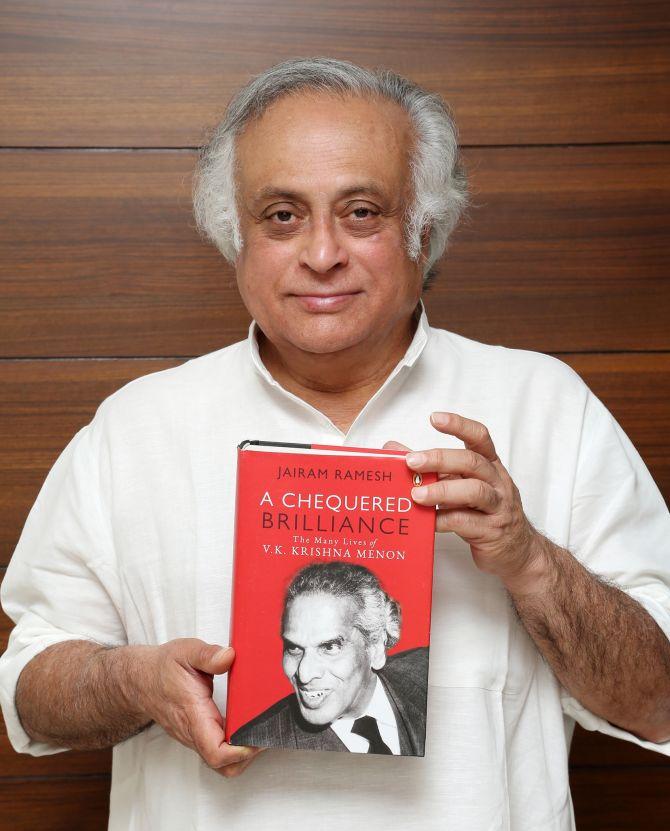 IMAGE: Jairam Ramesh. Photograph: Sreeram Selvaraj for Rediff.com
IMAGE: Jairam Ramesh. Photograph: Sreeram Selvaraj for Rediff.comKrishna Menon was too indisciplined, too much of a maverick, to be a member of the Communist party. The Communist party requires a person to be conformist and disciplined, and toe the party line, but Krishna Menon would never do that because he was too much of an individualist.
Yes, he was fond of the British Communist party and addressed meetings organised by them, but he was not a Communist or a Marxist. He used them because it was convenient for him as they advocated for India's Independence.
Like he used them after Independence to get elected?
Absolutely. In 1967, he quit the Congress party when they did not give him a ticket for the third time. But the Communists accommodated him by giving him tickets in 1969 and 1971.
It is interesting, he couldn't speak a word of Malayalam, but got elected from Trivandrum. All of Krishna Menon's campaign materials in his handwriting, were in English.
You described his 'chequered brilliance'.
He was too brilliant for his own good. He didn't suffer fools kindly. He was idiosyncratic to the extreme.
Intellectual arrogance?
Yes, he was intellectually arrogant unlike Nehru who had grace. I think the Gandhian influence on Nehru tempered the natural arrogance that would come to somebody of of Nehru's aristocratic background. I think Gandhi smoothened the rough edges.
Krishna Menon was a loner and not a team player. Even in his political career, it was just him and Nehru.
So, he was not a politician in the strictest term...
He was not a politician.
A diplomat?
For a diplomat, he was notoriously undiplomatic.
Is it not surprising that an undiplomatic diplomat had so many diplomatic successes like ending the Korean war, defusing tension between China and the USA, political settlement in Vietnam?
Yes, he had succeeded. That was why he was called Formula Menon. When somebody went to him with a problem, he would come up with a formula, whether it was Korea or US-China or Suez Canal.
What is the difference between a diplomat and a formula man?
A diplomat indulges in a little bit of hypocrisy, he doesn't always say what he means. Krishna Menon was a straight shooter and there was no hypocrisy about him.
Still, he succeeded as a diplomat.
Yes, he succeeded as a diplomat. That was because of his intellect. He was intellectually brilliant. I think people saw the sharp intellect that he had.
Till 1957, Krishna Menon was a great name in international diplomacy. Articles were written about him, books were written about him.
People hated him. People loved him. But people could never ignore him.
Was he hated in India?
In India, the Congress party hated him because he had not gone to jail, he was not lathi charged, he had not gone on hunger strike. They felt he had lived in London all his life and then he came to India and became an MP and a minister.
Above all, he was very close to Nehru.
Was his closeness to Nehru more than his intellectual arrogance that made Congressmen hate him?
Those who couldn't attack Nehru, attacked Krishna Menon. He became a proxy target.
It was Rajaji who got him back in 1953. In 1957, Rajaji issued a public statement that a vote for Krishna Menon was a vote for India when he was contesting for the first time from Bombay North for the Lok Sabha.
Rajaji was a great admirer of Krishna Menon till 1962. In 1962, Rajaji called for his resignation in the wake of the Chinese war.
So, he had friends, he had admirers, but he was hated too. He was a lonely man. He never married.
Was that the reason why he was misunderstood as people didn't know the real Krishna Menon?
He certainly did much to make himself misunderstood; his style, the manner of his speaking, the sarcasm... Deep down, he was a very insecure man.
What was a successful intellectual like him insecure about?
He was insecure as his base was only because of Nehru.
When Nehru was strong, he was strong. When Nehru was weak, he was weak. He was unsure about it.
Actually, he was part of Nehru's family. He was very close to Indira Gandhi. He was very close to Feroz Gandhi. In fact, he knew Feroz Gandhi before he came to know Indira Gandhi.
One of the very few people who called her Indu....
Yes. And she called him Krishna though he was 21 years older than her. Feroz also called him Krishna.
He was part of Nehru's family.

